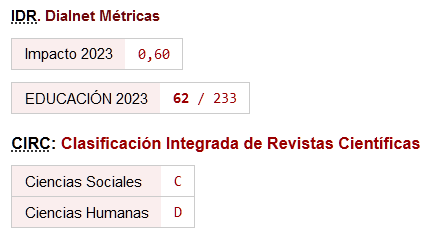El bienestar de los docentes en tiempos de pandemia Covid-19: factores que explican el bienestar profesional
DOI:
https://doi.org/10.46661/ijeri.5120Palabras clave:
COVID-19, docentes, bienestar, satisfacción laboral, perspectivas de futuroResumen
El objetivo de este estudio transversal fue describir y analizar factores relacionados con el bienestar profesional de los docentes portugueses durante la pandemia de COVID-19. Se aplicó un cuestionario validado, anónimo y en línea a una muestra no probabilística de docentes portugueses. Además de las variables sociodemográficas y profesionales, el cuestionario midió el bienestar subjetivo y profesional, la satisfacción con el sistema educativo y las perspectivas futuras con respecto a las circunstancias profesionales. Se analizaron las características psicométricas del cuestionario, se utilizó la prueba t y ANOVA para analizar las diferencias entre las principales variables y las características sociodemográficas y profesionales, junto con el modelo lineal generalizado para determinar con mayor precisión los factores predictores de Bienestar profesional de los docentes. Los resultados mostraron que la mayoría de los encuestados tienen una percepción moderadamente positiva del bienestar. Los docentes estaban satisfechos con el sistema educativo antes de la pandemia. La pandemia ha reducido la percepción de bienestar frente a la profesión, creando cierta preocupación entre los profesores sobre su futuro profesional. El sexo, la duración del servicio, el bienestar, las percepciones de las dificultades de enseñanza y las perspectivas futuras demostraron ser predictores del bienestar profesional en tiempos de pandemia. Este estudio proporcionó bases científicas para el desarrollo de intervenciones que mejoran el bienestar profesional de los docentes, que se centran en el manejo emocional y el desarrollo de habilidades digitales en docentes con largas carreras. Esta investigación concluyó con evidencia exhaustiva de que existe la necesidad de una mayor y más fuerte inversión en políticas públicas para la reforma y, en consecuencia, para la renovación de la clase docente.
Descargas
Citas
Alves, R. F., Precioso, J. A. G., & Becona, E. (2020). Well-being and health perception of university students in Portugal: the influence of parental support and love relationship. Health Psychology Report, 8(2), 145–154. https://doi.org/10.5114/hpr.2020.94723
Azevedo, J., Veiga, J., & Ribeiro, D. (2016). As preocupações e motivações dos professores: apresentação dos resultados de um inquérito (Fundação M). Vila Nova de Gaia, Portugal.
Aziri, B. (2011). Job satisfaction: a literature review. Management Research and Practice, 3(4), 77–86.
Becker, E. S., Goetz, T., Morger, V., & Ranellucci, J. (2014). The importance of teachers’ emotions and instructional behavior for their students’ emotions - An experience sampling analysis. Teaching and Teacher Education, 43, 15–26. https://doi.org/10.1016/j.tate.2014.05.002
Briones, P. E., Urbieta, T. C., & Arenas, M. A. (2010). Job Satisfaction of Secondary School Teachers: Effect of Demographic and Psycho-Social Factors. Revista de Psicología Del Trabajo y de Las Organizaciones, 26(2), 115–122. https://doi.org/10.5093/tr2010v26n2a3
Bullough, R. V., Hall-Kenyon, K. M., & MacKay, K. L. (2012). Head Start Teacher Well-Being: Implications for Policy and Practice. Early Childhood Education Journal, 40(6), 323–331. https://doi.org/10.1007/s10643-012-0535-8
Çevik, G. B. (2017). The Roles of Life Satisfaction, Teaching Efficacy, and Self-esteem in Predicting Teachers’ Job Satisfaction. Universal Journal of Educational Research, 5(3), 338–346. https://doi.org/10.13189/ujer.2017.050306
Chan, D. W. (2006). Emotional intelligence and components of burnout among Chinese secondary school teachers in Hong Kong. Teaching and Teacher Education, 22(8), 1042–1054. https://doi.org/10.1016/j.tate.2006.04.005
Christensen, L. B., Johnson, B., & Turner, L. A. (2015). Research methods, design, and analysis. Boston: Pearson.
Collie, R. J., Shapka, J. D., Perry, N. E., & Martin, A. J. (2015). Teacher Well-Being: Exploring Its Components and a Practice-Oriented Scale. Journal of Psychoeducational Assessment, 33(8), 744–756. https://doi.org/10.1177/0734282915587990
Demirel, H. (2014). An investigation of the relationship between job and life satisfaction among teachers Selection and peer review under the responsibility of Prof. Dr. Servet Bayram. Procedia-Social and Behavioral Sciences, 116, 4925–4931. https://doi.org/10.1016/j.sbspro.2014.01.1051
Diener, E., Lucas, R. E., & Oishi, S. (2018). Advances and Open Questions in the Science of Subjective Well-Being. Collabra: Psychology, 4(1), 15. https://doi.org/10.1525/collabra.115
Feng, B. (2007). A study of teacher job satisfaction and factors that influence it. Chinese Education and Society, 40(5), 47–64. https://doi.org/10.2753/CED1061-1932400506
Furtado, S. C. O., & Medeiros, T. (2017). Subjective well-being of teachers in pre-retirement. Revista de Estudios e Investigación En Psicología y Educación, 4(2), 99. https://doi.org/10.17979/reipe.2017.4.2.1889
Garrick, A., Mak, A. S., Cathcart, S., Winwood, P. C., Bakker, A. B., & Lushington, K. (2018). Non-Work Time Activities Predicting Teachers’ Work-Related Fatigue and Engagement: An Effort-Recovery Approach. Australian Psychologist, 53(3), 243–252. https://doi.org/10.1111/ap.12290
Goroshit, M., & Hen, M. (2016). Teachers’ empathy: can it be predicted by self-efficacy? Teachers and Teaching: Theory and Practice, 22(7), 805–818. https://doi.org/10.1080/13540602.2016.1185818
Gursel, M., Sunbul, A. M., & Sari, H. (2002). An analysis of burnout and job satisfaction between Turkish headteachers and teachers. European Journal of Psychology of Education, 17(1), 35–45. Retrieved from http://www.jstor.com/stable/23421427
Harding, S., Morris, R., Gunnell, D., Ford, T., Hollingworth, W., Tilling, K., … Kidger, J. (2019). Is teachers’ mental health and wellbeing associated with students’ mental health and wellbeing? Journal of Affective Disorders, 242, 180–187. https://doi.org/10.1016/j.jad.2018.08.080
Hongying, S. (2007). Literature Review of Teacher Job Satisfaction. Chinese Education & Society, 40(5), 11–16. https://doi.org/10.2753/CED1061-1932400502
Huang, S., & Yin, H. (2018). Teacher Efficacy and Affective Well-Being in Hong Kong: An Examination of Their Relationships and Individual Differences. ECNU Review of Education, 1(2), 102–126. https://doi.org/10.30926/ecnuroe2018010205
Inandi, Y., Tunç, B., & Uslu, F. (2013). Relationship between job satisfaction and career barriers for the academic staff of the education faculties. Journal of Educational Sciences Research, 3(1), 219–238. https://doi.org/10.12973/jesr.2013.3112a
Inchley, J. C., Currie, D., Budisavljevic, S., Torsheim, T., Jåstad, A., Cosma, A., … Arnarsson, Á. M. (2020). Spotlight on adolescent health and well-being. Findings from the 2017/2018 Health Behaviour in School-aged Children (HBSC) survey in Europe and Canada. International report. Volume 1. Key findings. (Vol. 1). Copenhagen. Retrieved from www.euro.who.int
Jensen, B., Sandoval-Hernández, A., Knoll, S., & Gonzalez, E. J. (2012). The Experience of New Teachers: Results from TALIS 2008 (TALIS). OECD. https://doi.org/10.1787/9789264120952-en
Katrin Arens, A., & Morin, A. J. S. (2016). Relations between teachers’ emotional exhaustion and students’ educational outcomes. Journal of Educational Psychology, 108(6), 800–813. https://doi.org/10.1037/edu0000105
Kidger, J., Brockman, R., Tilling, K., Campbell, R., Ford, T., Araya, R., … Gunnell, D. (2016). Teachers’ wellbeing and depressive symptoms, and associated risk factors: A large cross sectional study in English secondary schools. Journal of Affective Disorders, 192, 76–82. https://doi.org/10.1016/j.jad.2015.11.054
Klassen, R. M., & Chiu, M. M. (2010). Effects on Teachers’ Self-Efficacy and Job Satisfaction: Teacher Gender, Years of Experience, and Job Stress. Journal of Educational Psychology, 102(3), 741–756. https://doi.org/10.1037/a0019237
Konu, A., Viitanen, E., & Lintonen, T. (2010). Teachers’ wellbeing and perceptions of leadership practices. International Journal of Workplace Health Management, 3(1), 44–57. https://doi.org/10.1108/17538351011031939
Kotaman, H. (2016). Turkish early childhood teachers’ emotional problems in early years of their professional lives. European Early Childhood Education Research Journal, 24(3), 365–381. https://doi.org/10.1080/1350293X.2014.970849
Kurt, N., & Demirbolat, A. O. (2019). Investigation of the Relationship Between Psychological Capital Perception, Psychological Well-Being and Job Satisfaction of Teachers. Journal of Education and Learning, 8(1). https://doi.org/10.5539/jel.v8n1p87
Kyriacou, C. (2001). Teacher stress: Directions for future research. Educational Review, 53(1), 27–35. https://doi.org/10.1080/00131910120033628
Mattern, J., & Bauer, J. (2014). Does teachers’ cognitive self-regulation increase their occupational well-being? The structure and role of self-regulation in the teaching context. Teaching and Teacher Education, 43, 58–68. https://doi.org/10.1016/j.tate.2014.05.004
McInerney, D. M., Korpershoek, H., Wang, H., & Morin, A. J. S. (2018). Teachers’ occupational attributes and their psychological wellbeing, job satisfaction, occupational self-concept and quitting intentions. Teaching and Teacher Education, 71, 145–158. https://doi.org/10.1016/j.tate.2017.12.020
Mehdinezhad, V. (2012). Relationship between High School teachers’ wellbeing and teachers’ efficacy. Acta Scientiarum. Education, 34(2). https://doi.org/10.4025/actascieduc.v34i2.16716
Moè, A., Pazzaglia, F., & Ronconi, L. (2010). When being able is not enough. The combined value of positive affect and self-efficacy for job satisfaction in teaching. Teaching and Teacher Education, 26(5), 1145–1153. https://doi.org/10.1016/j.tate.2010.02.010
Puertas Molero, P., Zurita Ortega, F., Ubago Jiménez, J. L., & González Valero, G. (2019). Influence of Emotional Intelligence and Burnout Syndrome on Teachers Well-Being: A Systematic Review. Social Sciences, 8(6), 185. https://doi.org/10.3390/socsci8060185
Pulido-Martos, M., Lopez-Zafra, E., Estévez-López, F., & Augusto-Landa, J. M. (2016). The Moderator Role of Perceived Emotional Intelligence in the Relationship between Sources of Stress and Mental Health in Teachers. Spanish Journal of Psychology, 19. https://doi.org/10.1017/sjp.2016.8
Reimer, F. M., & Schleicher, A. (2020). Schooling Disrupted, Schooling Rethought: How the Covid-19 pandemic is changing education.
Sahito, Z., & Vaisanen, P. (2020). A literature review on teachers’ job satisfaction in developing countries: Recommendations and solutions for the enhancement of the job. Review of Education, 8(1), 3–34. https://doi.org/10.1002/rev3.3159
Sisask, M., Värnik, P., Värnik, A., Apter, A., Balazs, J., Balint, M., … Wasserman, D. (2014). Teacher satisfaction with school and psychological well-being affects their readiness to help children with mental health problems. Health Education Journal, 73(4), 382–393. https://doi.org/10.1177/0017896913485742
Skaalvik, E. M., & Skaalvik, S. (2015). Job satisfaction, stress and coping strategies in the teaching profession-what do teachers say? International Education Studies, 8(3), 181–192. https://doi.org/10.5539/ies.v8n3p181
Spector, P. (1997). Job Satisfaction: Application, Assessment, Causes, and Consequences. 2455 Teller Road, Thousand Oaks California 91320 United States: SAGE Publications, Inc. https://doi.org/10.4135/9781452231549
Spilt, J. L., Koomen, H. M. Y., & Thijs, J. T. (2011, December 12). Teacher Wellbeing: The Importance of Teacher-Student Relationships. Educational Psychology Review. Springer. https://doi.org/10.1007/s10648-011-9170-y
Tang, Y. (2018). What makes rural teachers happy? An investigation on the subjective well-being (SWB) of Chinese rural teachers. International Journal of Educational Development, 62, 192–200. https://doi.org/10.1016/j.ijedudev.2018.05.001
Virtanen, A., De Bloom, J., & Kinnunen, U. (2020). Relationships between recovery experiences and well-being among younger and older teachers. International Archives of Occupational and Environmental Health, 93(2), 213–227. https://doi.org/10.1007/s00420-019-01475-8
Yildirim, K. (2015). Testing the main determinants of teachers’ professional well-being by using a mixed method. Teacher Development, 19(1), 59–78. https://doi.org/10.1080/13664530.2014.970663
Yin, H. biao, Lee, J. C. K., Zhang, Z. hua, & Jin, Y. le. (2013). Exploring the relationship among teachers’ emotional intelligence, emotional labor strategies and teaching satisfaction. Teaching and Teacher Education, 35, 137–145. https://doi.org/10.1016/j.tate.2013.06.006
Yorulmaz, Y. I., Colak, I., & Altinkurt, Y. (2017). A Meta-Analysis of the Relationship Between Teachers’ Job Satisfaction and Burnout. Eurasian Journal of Educational Research, 17(71), 175–192. https://doi.org/10.14689/ejer.2017.71.10
Zacher, H., & Schmitt, A. (2016). Work Characteristics and Occupational Well-Being: The Role of Age. Frontiers in Psychology, 7. https://doi.org/10.3389/fpsyg.2016.01411
Descargas
Publicado
Cómo citar
Número
Sección
Licencia
Derechos de autor 2020 Regina Alves, Teresa Lopes, José Precioso

Esta obra está bajo una licencia internacional Creative Commons Atribución-NoComercial-SinDerivadas 4.0.











